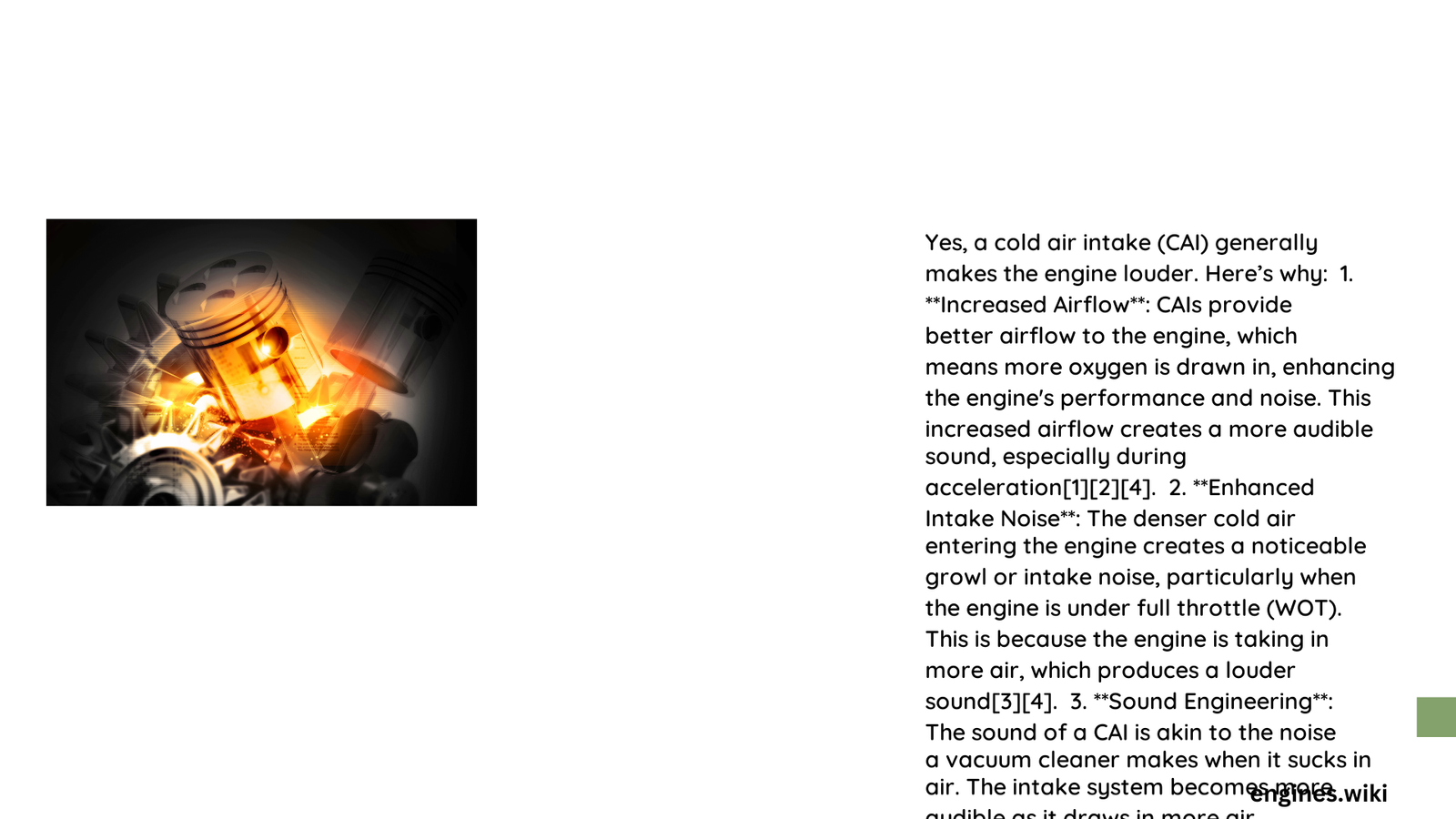Cold air intakes are popular automotive modifications that significantly transform engine sound dynamics. Vehicle enthusiasts often seek these performance upgrades to enhance their engine’s acoustic profile, with a primary question: does cold air intake make engine louder? By introducing denser, colder air into the engine’s intake system, these modifications not only improve performance but also create a more aggressive and pronounced intake noise that many drivers find appealing.
What Causes Cold Air Intake to Increase Engine Sound?
Cold air intakes fundamentally alter the engine’s sound characteristics through several key mechanisms:
How Does Airflow Impact Engine Noise?
- Increased Air Volume: More direct airflow creates a more pronounced intake sound
- Reduced Intake Restrictions: Eliminates factory intake system’s sound-dampening components
- Enhanced Acoustic Resonance: Allows for a clearer, more aggressive engine note
What Determines the Sound Intensity?
| Factor | Sound Impact | Performance Influence |
|---|---|---|
| Intake Tube Diameter | Higher diameter = Louder sound | Increased airflow potential |
| Filter Design | Open filters produce more noise | Better air filtration |
| Material Composition | Aluminum tubes amplify sound | Lightweight performance |
Can Different Vehicle Types Produce Varied Sound Levels?
Different vehicles respond uniquely to cold air intake installations:
- Sports cars typically exhibit more dramatic sound changes
- Luxury vehicles might have more subtle acoustic transformations
- Truck and SUV engines often produce deeper, more robust intake sounds
Technical Insights into Cold Air Intake Sound Dynamics

Cold air intakes fundamentally modify engine acoustics by:
- Removing restrictive factory airbox designs
- Creating a more direct path for air intake
- Reducing sound-dampening materials
- Introducing larger, less constrained intake tubes
What Acoustic Characteristics Define Cold Air Intake Sounds?
The sound profile typically includes:
– A deeper, more aggressive “growl”
– Increased intake noise during acceleration
– More pronounced turbocharger or supercharger sounds
– Enhanced mechanical engine note
Performance vs. Sound: Understanding the Balance
While sound is important, cold air intakes primarily serve performance objectives:
- Horsepower Gains: 5-20 additional horsepower
- Improved Throttle Response: Quicker acceleration
- Enhanced Fuel Efficiency: Potential 1-2 MPG improvements
- Sound Enhancement: Secondary but significant benefit
Expert Recommendations for Optimal Sound and Performance
Professional automotive technicians suggest:
- Choose high-quality, vehicle-specific cold air intake systems
- Consider professional installation for precise fitment
- Understand local noise regulation compliance
- Balance performance gains with acoustic preferences
Potential Limitations and Considerations
- Not all vehicles will experience identical sound transformations
- Quality of installation significantly impacts acoustic results
- Some jurisdictions have strict noise regulation standards
How Much Can You Expect to Invest?
Cold air intake systems range from $200 to $600, depending on:
– Vehicle make and model
– Brand reputation
– Material quality
– Included performance features
Final Sound Performance Assessment
Cold air intakes definitively make engines louder by removing sound-dampening restrictions and creating more direct airflow. The sound increase varies by vehicle type, intake design, and installation quality.
Pro Tip: Always consult automotive professionals to understand your specific vehicle’s sound and performance potential.
